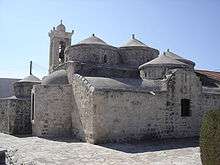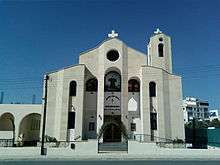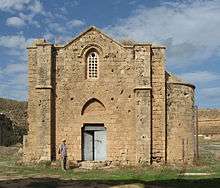Religion in Cyprus
Christians make up 78% of the Cypriot population. Most Greek Cypriots, and thus the majority of the population of Cyprus, are members of the Autocephalous Greek Orthodox Church of Cyprus (Church of Cyprus), whereas most Turkish Cypriots are officially Sunni Muslim. In addition to the Orthodox Christian and Sunni Muslim communities, there are also small Baha'i, Jewish, Protestant (including Anglican), Roman Catholic, Maronite (Eastern Rites Catholic) and Armenian Apostolic communities in Cyprus.
Christianity

Greek Orthodox Church of Cyprus
The most important church in Cyprus, the Church of Cyprus, is an autocephalous Greek Orthodox Church within the Orthodox tradition using the Greek liturgy. It recognized the seniority and prestige of the ecumenical patriarch in Constantinople, while retaining complete administrative autonomy under its own archbishop. Seven sacraments are recognized: baptism in infancy, followed by confirmation with consecrated oil, penance, the Eucharist, matrimony, ordination, and unction in times of sickness or when near death.
Armenian Church in Cyprus

The presence of Armenians in Cyprus dates back to 578. Currently, Armenian-Cypriots maintain a notable presence of about 3,500 persons, mainly inhabiting the urban areas of Nicosia, Larnaca and Limassol. Recently, some Armenian immigrants have settled Paphos.
The Armenian Prelature of Cyprus has had a continuous presence on the island since its establishment in 973 by Catholicos Khatchig I.
Roman Catholicism

The Catholic Church in Cyprus is part of the worldwide Catholic Church under the spiritual leadership of the Pope in Rome. There are around 10,000 Catholics in Cyprus, corresponding to just over 1% of the population. Most Catholics in Cyprus are Maronites (Eastern Rite Catholics). In the 1891 census, out of 209,286 Cypriots 1,131 were Maronites.
Protestantism and Anglicanism
The Anglican Church of Cyprus was established in 1878. As of 1976, it falls under the Diocese of Cyprus and the Gulf. Anglicans and Protestants, according to the official 2011 population census, amount to 2.02% of the population. With regard to Northern Cyprus, Turkish Cypriot Protestants and Anglicans are a very small community. The community numbers around five hundred and can be found living throughout northern Cyprus.[3]
Islam
Muslims make up about 18% of the Cypriot population.
Islam was first introduced to Cyprus when Uthman, the third Caliph of the Arab Rashidun Empire, conquered the island in 649. Cyprus remained a disputed territory between the Greeks and Arabs for the following centuries, until it passed to Latin authority during the Crusades. The island was conquered by the Ottoman general Lala Mustafa Pasha from the Venetians in 1570. This conquest brought with it Turkish settlement from 1571 until 1878. During the 17th century especially, the Muslim population of the island grew rapidly, partly because of Turkish immigrants but also due to Greek converts to Islam.
Turkish Cypriots are the overwhelming majority of the island's Muslims, along with Turkish settlers from Turkey and adhere to the Sunni branch of Islam. Sufism also plays an important role. Historically, Muslims were spread over the whole of Cyprus, but since 1974 they have lived primarily in the north. The Ahmadiyya Community has a presence in north.[4]
Several important Islamic shrines and landmarks exist on the island including:
- The Arabahmet Mosque in Nicosia (built in the 16th century)
- The Hala Sultan Tekke/Umm Haram Mosque in Larnaca (built in the 18th century)
- The Lala Mustafa Pasha Mosque, Selimiye Mosque and the Haydarpasha Mosque; former Catholic cathedrals left from the Crusader era, which were meant to cater exclusively to the Catholic minority which ruled the island and were converted to mosques after the Muslim conquest in the Middle Ages.
All of the listed, apart from the Hala Sultan Tekke, are in the north.
Buddhism
Hinduism
Judaism
Jewish presence in Cyprus dates back to the 3rd century BC, after trade relations had been established between Cyprus and the Land of Israel.[5] Today, approximately 1800 Cypriots are Jewish. There is a Synagogue in Larnaca.
References
- ↑ .
- ↑ .
- ↑
- ↑ "Members Of The Ahmadiyya Muslim Community Dr Muhammed Jalal Shams, Osman Seker, Kubilay Çil: Prisoners of conscience for their religious beliefs". Amnesty International. June 5, 2002. Retrieved June 10, 2014.
- ↑ "Cyprus: Virtual Jewish History Tour". Jewish Virtual Library. Retrieved February 21, 2013.
![]() This article incorporates public domain material from websites or documents of the Library of Congress Country Studies.
This article incorporates public domain material from websites or documents of the Library of Congress Country Studies.
External links
| ||||||||||||||||||||||||||||||||||||||||||||||||||||||||||||
| ||||||||||||||||||||||
| ||||||||||||||



